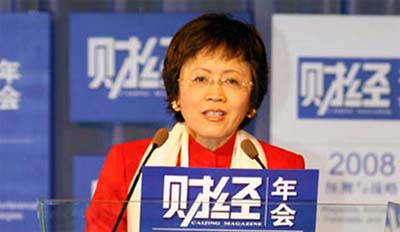A myriad of reasons have been suggested behind this dramatic turn of events, from more innocuous explanations, such as the allocation of lucrative advertising revenues, to the more sensitive issue of editorial independence from Beijing’s media watchdog. The future of Caijing, or perhaps more likely Hu Shuli’s new publication in the event of her resignation, will be an important barometer by which to measure Beijing’s declared new openness.
Hu Shuli’s exploits in the Chinese media scene are the stuff of legend, her razor-sharp investigative journalism, especially in China’s embryonic and murky securities industry, earning her the enmity of industry heavies. In October 2000, she published an explosive story of massive corruption and collusion within China’s fund management industry, leaving no stone unturned in the exposé. So damaging was the report that ten of the largest funds in China were forced to take out full-page declarations of innocence on major broadsheets. She stoically withstood pressure from various sources and penned a rebuttal that vigorously defended the media’s right to scrutinise and the public’s right to know. As result, she has been described as ‘the most dangerous woman in China’ by Business Weekly.
She didn’t stop there as a financial journalist dedicated to exposing industry scandals and irregularities. Instead she embraced a broader crusade to expose the ills of China, from the SARS epidemic to shoddy school buildings exposed by the great earthquake in Sichuan last year. More recently, she has also launched salvos against the Chinese government’s plan to implement the Green Dam to filter internet content, and scratched underneath the edifice of the lucrative trade in human organs. There is no doubt that Hu’s ever more aggressive reporting style is like a sword of Damocles looming over the future of Caijing and the financial fortune of Caijing’s business publishers, the Stock Exchange Executive Council.
It is possible that Hu’s ambitious plan to broaden Caijing’s media platform including a news wire service and her ever more politically sensitive coverage is the bridge too far for her business backers that led to the dispute resulting in the exodus of top personnel. Though Caijing has rarely incurred the wrath of China’s media censors due to a combination of Hu’s political savvy and the protection offered by her powerful business backers, this doesn’t mean that it will be smooth sailing for the magazine in the future. A few heads must have already turned in Zhongnanhai.
It seems perhaps axiomatic to assert that China’s future rests on further openness in economic and political development. A critical media that is capable of exercising its vital role as the fourth estate would appear an indispensable part of China’s reform. Caijing could be a litmus test in this respect. It is unrealistic to expect an overnight relaxation on media censorship, but it would be wise for Beijing to allow Hu Shuli to continue her experiment step by step with occasional warning signposts and guidance along the road to a freer media landscape in China.
The existence of a credible and independent voice in China is also crucial to Beijing’s plan to become a responsible stakeholder in the international system. The vast state-controlled media empire seems incapable of fighting back the international media on issues of vital interest to China such as Tibet and Xinjiang. Despite the death of hundreds of innocent Han Chinese residents on the streets of Urumqi at the hands of Uyghur mobs, the state media was unable to capture the moral high ground for Beijing and instead made a martyr out of a previously obscure Uyghur leader.
A magazine, such as Caijing, reporting objectively from a Chinese perspective, is much more likely to garner international sympathy and understanding than papers staffed by thousands of political ideologues.

